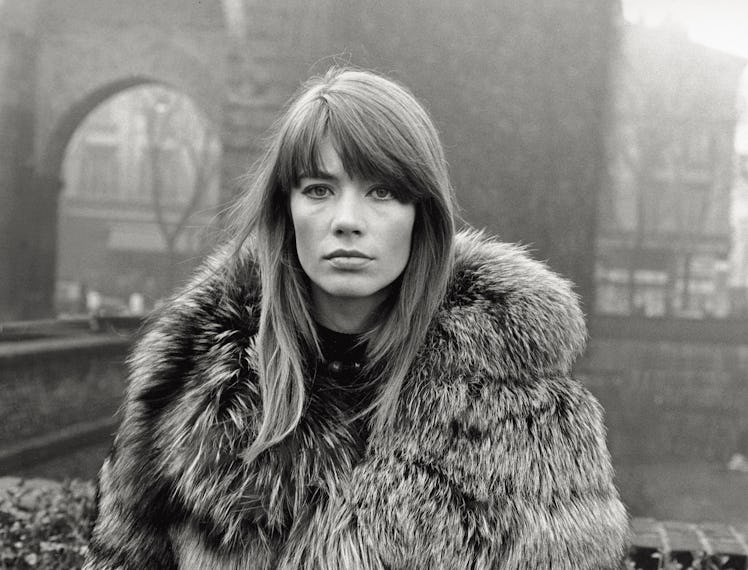Françoise Hardy, the French Singer and Style Icon, Dies at 80

Françoise Hardy, the French singer, actress, and fashion icon, who inspired designers and musicians alike, has died at the age of 80 of laryngeal cancer, her son confirmed on Tuesday. “Maman est partie,” or “Mom is gone,” Thomas Dutronc, who is also a musician, wrote as the caption to an old baby photo with Hardy on Instagram.
Hardy was born in Paris on January 14, 1944, and raised in the city by her mother. The Parisian was interested in music from a young age, and after receiving her first guitar at 16, she began writing her own songs and auditioning for record labels. The work quickly paid off when, in 1962, she got signed to Disques Vogue and released her first song, “Tous les Garcons et les Filles” (“All the Boys and Girls”). Before long, she was a major player in the growing “yé-yé” movement, which took inspiration from English-language rock, and was so named because of the frequent use of the word “yeah.”
Hardy in Paco Rabanne in 1968.
Early singles like “Je Suis D’Accord” (“I Agree”) and “Le Temps de L’Amour” (“The Time of Love”) topped the French charts and helped Hardy gain a following throughout Europe. She began recording in multiple languages and collaborating with more songwriters. In 1968, her cover of “Comment te Dire Adieu” (“It Hurts to Say Goodbye”) became one of her biggest hits. At the same time, Hardy was becoming known for her image, which helped to define the 20th-century French look—a casual, rock and roll coolness mixed with clean tailoring. She inspired many of the age’s most popular designers, including Yves Saint Laurent and his Le Smoking look. She wore designs by Paco Rabanne while performing and could often be seen in André Courrèges’s space-age fashions. The influences didn’t end in the ’60s however, as Rei Kawakubo took the name Comme des Garçons from a line in “Tous les Garcons et les Filles,” and Louis Vuitton creative director Nicolas Ghesquière described her as “the very essence of French style.”
Of course, Hardy inspired musicians as well, and many of the biggest names in the ’60s scene were enamored with her, including Mick Jagger who reportedly called her his “ideal woman” and David Bowie who was said to be “passionately in love” with the singer. Bob Dylan dedicated a poem to Hardy on the back of his 1964 album Another Side of Bob Dylan. It read in part, “For Françoise Hardy/at the seine's edge/a giant shadow/of Notre Dame/seeks t' grab my foot...”
In the ’60s, Hardy also worked briefly as an actress, making her film debut in 1963 as Ophelia in Roger Vadim's Château en Suède. She made a brief cameo in What’s New Pussycat? and had a role in John Frankenheimer’s Grand Prix, though she never took her acting career as seriously as her musical endeavors.
Hardy, with actor Jack Brabham, on the set of Grand Prix in 1966.
In 1967, Hardy began dating fellow musician Jacques Dutronc, and the couple welcomed their son, Thomas, together in 1973, later marrying in 1981. Though they separated in 1988 and went on to have other relationships, they never got divorced.
As the century ticked on, Hardy’s releases became less frequent, though Hardy kept making new music, putting out her final album, Personne D’Autre (Nobody Else), in 2018. In addition to music and acting, Hardy also studied astrology, and she was published often on the subject. She also wrote both fiction and non-fiction, as well as her autobiography, Le désespoir des singes... et autres bagatelles.
Hardy and Dutronc.
In late 2004, Hardy was diagnosed with MALT lymphoma and underwent chemotherapy as treatment. By 2021, her health had worsened and the singer became a public supporter of physician-assisted suicide in France. “I am not afraid of dying but I am very, very afraid of suffering,” she told Paris Match, calling France “inhumane” for prohibiting euthanasia.
Hardy will be remembered for her work in music, her influence on the singers and designers, both of her time and today, and her singular style. She is survived by her son, as well as her husband.